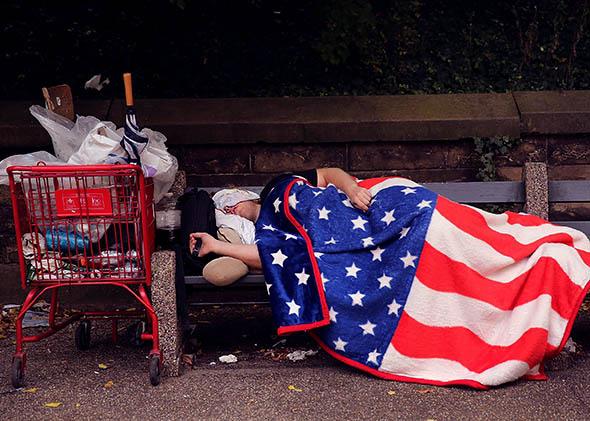The wealthiest Americans don’t care about inequality, and our presidential candidates are following their lead.
That’s not to say they aren’t talking about inequality. They are, for anyone who will listen. As Noam Scheiber notes for the New York Times, Sens. Ted Cruz, Rand Paul, and Marco Rubio broached the issue in January, while Hillary Clinton discussed it at the Center for American Progress last week. But none of them have ideas for tackling the problem. Neither Cruz nor Paul nor Rubio was willing to say “the government should intervene to solve it,” while Clinton would rather retreat to platitudes—“We have to have a concerted effort to meet a consensus about how to deal with this”—than give solutions.
That Republicans would reject a fix to income inequality is expected. The party—even its so-called “reform” conservatives—is committed to upper-income tax breaks and deep cuts to the social safety net. If the GOP sees a problem, it’s too much redistribution to low-income Americans, and too little support for “makers,” “job creators,” and the idle rich.
Clinton’s silence, on the other hand, is disappointing. In the 2008 election, she sold herself as a fighter for working-class voters and union members, even as Barack Obama won endorsements from groups like the SEIU and the AFL-CIO. In a race where her past—from critiques of the “coronation” to her vote on the Iraq War—was a problem, this couldn’t blunt Obama’s appeal to a huge portion of the Democratic Party. In the age of Elizabeth Warren, however, it could be effective rhetoric for the eventual primary and the general election, where Democrats will need to break from the present administration, appeal to working Americans, and give an alternative to the Republican Party.
But despite the obvious utility of a combative, working-class message—I will fight for your rights against the banks and the fat cats—it’s not going to happen. So far, Clinton is more interested in consensus than conflict, and there’s little chance that will change in her official presidential campaign.
Put differently, Clinton has no interest in offending donors and other wealthy supporters. Or, as Scheiber writes, “Though she derided the Republican practice of cutting taxes on the wealthy,” writes Scheiber, “she made no mention of tax increases or more aggressive measures, like capping the pay of chief executives or modestly taxing stock market transactions.”
With that said, it’s a little unfair to completely pin this on Clinton, who is responding to political incentives as much as she’s following her own beliefs and priorities. If Clinton had an incentive to adopt more populist rhetoric and tout more populist policies, she would take it, as she did in the final months of the 2008 campaign, when she especially emphasized her appeal to working-class whites (while dipping into some ugly racial territory).
No, the problem is that the Democratic Party lacks an institutional counterweight to the loud voices of wealthy donors and power brokers. There are unions, but they are weak, made brittle by declining membership and a new wave of “right-to-work” laws meant to undermine unions’ ability to represent all workers in a shop, eroding their viability. And while there are other groups that advocate for progressive economic policy and solutions to inequality, there’s no real substitute for unions and their broad influence among workers, activists, and lawmakers.
Yes, unions were rough and unpolished, often hidebound and prone to corruption. But they were also a broad force for the interests of working- and middle-class Americans. They organized, advocated, and pressured Democrats from the left, acting against the corporate and financial interests that hold a large say in Washington. Their decline doesn’t just correspond with the twilight of the social democratic vision in American politics—from the New Deal to the Great Society—it also corresponds with the overall decline of middle-class fortunes.
There is no balance of economic and political power. Instead, we have corporate dominance with modest resistance from the remnants of organized labor. As such, not only is it difficult to create periods of progressive change—it took eight years of disaster and an economic crisis to create the conditions for 2008—but it’s almost impossible to sustain them: The most productive period of Obama’s presidency lasted two years. Since then, it’s been defensive actions, rear-guard retreats, and the occasionally successful skirmish.
Liberals want the Democratic Party to be an effective vehicle for economic liberalism. But without a countervailing force to challenge business interests and support the left over the long term—beyond the occasional insurgent candidacy in a presidential campaign—there’s little hope for change.
One way to understand the dynamic is to look at the success of social liberalism in the Democratic Party. Social liberals aren’t just bolstered by activists; they have support from huge donors who support women’s rights and powerful corporations who back LGBT rights. That Democrats are largely unified against laws like Indiana’s Religious Freedom Restoration Act reflects the degree to which stakeholders are undivided.
It’s the reverse for economic liberals, whose modest position in the party isn’t strong enough to compel commitment to an agenda. In 2009, liberals wanted “card check” in the Employee Free Choice Act, but they couldn’t compel moderates to come along. It died.
Maybe, in the medium term, we’ll see a political alternative to unions. Until then, liberals are the minority partner in economic policymaking. Clinton will not challenge the wealthiest members of the Democratic coalition, and if she isn’t the nominee—if we end up with someone like Elizabeth Warren—we should expect the same. It’s the party that decides policy, not the candidate, and if the party isn’t interested in a serious challenge to economic inequality, then even with Warren at the top, it’s not going to happen.
